News & Announcements
- Details
- Written by Joshua Wachtel
Today's excerpt is from Julia Steiny writing at EdWeek and also on her blog. She says there is no evidence that punitive measures work to change students' behavior. But restorative justice does work. The piece is presented as an open letter to President Obama. The full link appears below.
No research shows that suspensions teach kids the social skills they need to keep them  from getting tossed out of school in the first place. None. Suspensions label a kid “bad,” which often becomes a self-fulfilling prophecy, even a badge of honor. Students who already experience failure at school welcome a few days’ vacation on the couch with a TV.
from getting tossed out of school in the first place. None. Suspensions label a kid “bad,” which often becomes a self-fulfilling prophecy, even a badge of honor. Students who already experience failure at school welcome a few days’ vacation on the couch with a TV.
But! Beastly behavior in class ruins teaching and learning. When feral or entitled children clown around, start fights or lash out at teachers with impunity, everyone suffers. Teachers and parents of the so-called “good” kids feel that removing the disruptor is the only real weapon they have against chaos.
- Details
- Written by Joshua Wachtel
Here are two clippings this week relevant to current trends of schools using restorative justice to move away from zero tolerance policies and address the disproportionate punishing of minority students. First from Denver, Colorado, then from California:
There were 185 expulsions in 2009-2010 compared to 63 last year, said John Simmons, executive director of student services for the district. Meanwhile, the number of out-of-school suspensions has declined in that same period from 9,558 to 7,525 last year.
Fifty-five percent of students suspended from school last year were Hispanic, which is close to the 58 percent of Hispanic students who attend school in the district.
The big gap is between white and black students. White students make up 20 percent of DPS students but only 8 percent of those suspended. Conversely, black students make up only 15 percent of district students but comprised 32 percent of those who faced out-of-school suspensions last year.
- Details
- Written by Joshua Wachtel
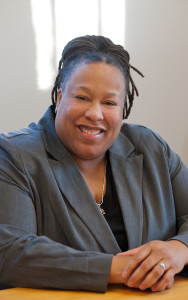 I'm continuing the Sunday videos series with the full plenary talk given by Dr. Stacey Miller, director of residential life at the University of Vermont at IIRP's 15th World Conference. Her 33 minute talk is well worth the time. It's not only highly informative, but also funny and lively, and provides a lot of clues about the type of leadership that is required to implement restorative practices not only at the university level, but also in schools, workplaces and other institutions. The talk is loaded with anecdotes and practical examples.
I'm continuing the Sunday videos series with the full plenary talk given by Dr. Stacey Miller, director of residential life at the University of Vermont at IIRP's 15th World Conference. Her 33 minute talk is well worth the time. It's not only highly informative, but also funny and lively, and provides a lot of clues about the type of leadership that is required to implement restorative practices not only at the university level, but also in schools, workplaces and other institutions. The talk is loaded with anecdotes and practical examples.
- Details
- Written by Joshua Wachtel
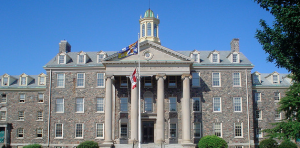 Photo by Duane Brown at Flickr Creative Commons
Photo by Duane Brown at Flickr Creative Commons
The following story was posted at CBC News Nova Scotia, about a restorative justice program set up at Dalhousie University. IIRP hosted its 14th World Conference in 2011 in Nova Scotia in cooperation with Nova Scotia Restorative Justice Community University Research Alliance (NSRJ-CURA). NSRJ-CURA director Jennifer Llewellyn, and a number of other participants at the conference, are also professors at Dalhousie University.
Dalhousie University students who end up in trouble with the law now have a way to try to right the wrong without having to go to court.
- Details
- Written by Joshua Wachtel
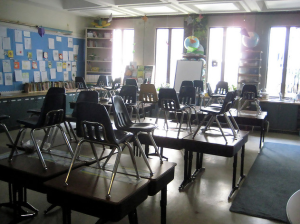 Photo by Kevin Wong, Flickr Creative Commons
Photo by Kevin Wong, Flickr Creative Commons
Lois Puglionesi writes in the DailyTimes, serving Delaware County, Pennsylvania, that Haverford School District is looking to address bullying utilizing restorative practices.
The article discusses bullying, its pervasiveness and possible reasons for its seeming rise:
In a presentation to the school board, Special Education Director Valerie Burnett said a recent Pennsylvania Youth Survey showed that bullying remains a key area of concern for schools across the state. Non-physical forms of bullying appear most prevalent, with one-third to more than half of students reporting that others had deliberately excluded, teased, or spread false rumors about them.
- Details
- Written by Joshua Wachtel
Ted Wachtel's plenary – "Defining Restorative and Building a Worldwide Restorative Practices Learning Network" – from this year's IIRP's 15th World Conference. View the video here.
- Details
- Written by Joshua Wachtel
The following is from an article in the Allentown Morning Call about some positive trends associated with Bethlehem School District high schools' implementation of IIRP's SaferSanerSchools Whole School Change Program.
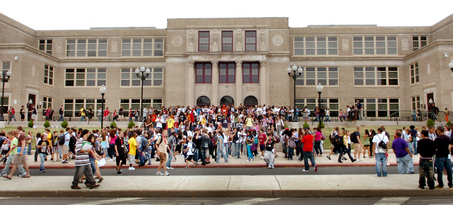 Liberty High School photo from Easton Express-TimesSuspensions, fights, bullying and other forms of poor student behavior dropped at Freedom and Liberty high schools during the 2011-12 school year, documents show.
Liberty High School photo from Easton Express-TimesSuspensions, fights, bullying and other forms of poor student behavior dropped at Freedom and Liberty high schools during the 2011-12 school year, documents show.
The improved discipline picture is a reversal of 2009-10 and 2010-11 when infractions went up in the Bethlehem Area School District's two high schools as part of a districtwide increase of 36 percent.
Compared with the 2010-11 school year, suspensions dropped 20 percent to 978 in 2011-12. The number of students suspended three times or more went down 43 percent to 493 at the two high schools over the same time frame, according to the Code of Conduct report, which separates offenses into three levels of severity.
- Details
- Written by Joshua Wachtel
 Estelle Macdonald of Hull Centre for Restorative Practice
Estelle Macdonald of Hull Centre for Restorative Practice
Here's a lovely piece by John Maslin from the Wanganui Chronicle about a two-day conference on the subject of Wanganui, New Zealand "re-inventing" itself as a restorative city. Estelle Macdonald, head teacher at Collingwood primary school in Hull and director of Hull Centre for Restorative Practice (an IIRP international affiliate) was the keynote speaker on the first day of the conference. Maslin's report is titled "Community must be involved." He writes:
Ms Macdonald's progressive ideas turned her school around from being one of the worst performers into one of the best in the space of a few years but, more importantly, saw the restorative practices implemented at her school adopted by the city. ...
- Details
- Written by Joshua Wachtel
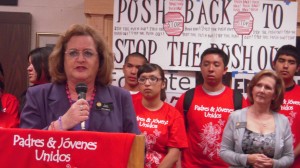 Sen. Evie Hudak, D-Westminster, co-sponsor of a law amending Colorado’s zero-tolerance school discipline policies, spoke at Thursday’s celebration at North High School in Denver. (From EdNews Colorado)From an article titled "Bills influencing school disciplinary policies head to governor via EdSource Today:
Sen. Evie Hudak, D-Westminster, co-sponsor of a law amending Colorado’s zero-tolerance school discipline policies, spoke at Thursday’s celebration at North High School in Denver. (From EdNews Colorado)From an article titled "Bills influencing school disciplinary policies head to governor via EdSource Today:
Seven bills that collectively will shift thinking on how California schools discipline students will likely land on the governor’s desk at the end of the current legislative session on Friday.
Although the bills no longer mandate changes that their authors originally envisioned, “they start to lay out alternatives to suspensions and expulsions,” said Erika Hoffman, a lobbyist for the California School Boards Association (CSBA). “These bills set out a process for how teachers, administrators, and school board members can begin to think about discipline differently.”
- Details
- Written by Joshua Wachtel
Here's another great short video from Restorative Justice Colorado. This one looks at a youth crime from a victim's point of view.

Restorative Works Year in Review 2024 (PDF)
All our donors are acknowledged annually in Restorative Works.
